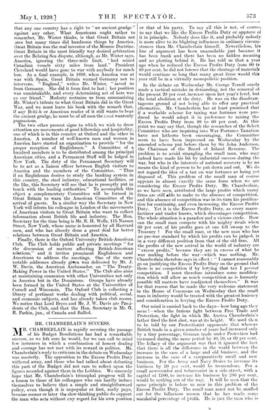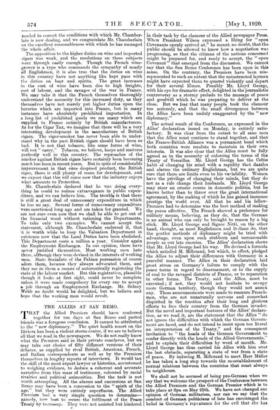MR. CHAMBERLAIN'S SUCCESS.
-AIR. CHAMBERLAIN in rapidly securing the passage .1N1 of his Budget Resolutions has had a remarkable success, as we felt sure he would, for we can call to mind few instances in which a combination of honest dealing and courage has not met with its reward in politics. Mr. Chamberlain's reply to criticism in the debate on Wednesday was masterly. The opposition to the Excess Profits Duty withered away, and those who had talked about defeating this part of the Budget did not care to reflect upon the figures recorded against them in the Lobbies. We sincerely hope that Mr. Chamberlain's triumphal progress will be a lesson to those of his colleagues who can hardly induce themselves to believe that a simple and straightforward policy, even though it is unpopular at first, really pays, because sooner or later the slow-thinking public do support the man who acts without any regard for his own position -AIR. CHAMBERLAIN in rapidly securing the passage .1N1 of his Budget Resolutions has had a remarkable success, as we felt sure he would, for we can call to mind few instances in which a combination of honest dealing and courage has not met with its reward in politics. Mr. Chamberlain's reply to criticism in the debate on Wednesday was masterly. The opposition to the Excess Profits Duty withered away, and those who had talked about defeating this part of the Budget did not care to reflect upon the figures recorded against them in the Lobbies. We sincerely hope that Mr. Chamberlain's triumphal progress will be a lesson to those of his colleagues who can hardly induce themselves to believe that a simple and straightforward policy, even though it is unpopular at first, really pays, because sooner or later the slow-thinking public do support the man who acts without any regard for his own position or that of his party. To say all this is not, of courso, to say that we like the Excess Profits Duty or approve of it in principle. Nobody does like it, and probably nobody is more alive to its blighting influences in ordinary circum- stances than Mr. Chamberlain himself. Nevertheless, his line of argument has been unassailable just because it has been frank and there has been no hidden meaning and no plotting behind it. He has told us that a yea' ago when he reduced the Excess Profits Duty from 80 to 40 per cent. he did not foresee that the shortage of materials would continue so long that many great firms would this year still be in a virtually monopolistic position.
In the debate on Wednesday Mr. George Terrell surely made a tactical mistake in demanding, not the removal of the present 20 per cent, increase upon last year's level, but the total abolition of the duty. He was on the disadvan- tageous ground of not being able to offer any practical alternative. Mr. Chamberlain has at least promised that if a workable scheme for taxing war fortunes were pro- duced he would adopt it in preference to raising the Excess Profits Duty from 90 to 60 per cent. At this point we may say that, though the researches of the Select Committee who are inquiring into War Fortunes Taxation have not hitherto been encouraging, the Committee seem to have been impressed on Wednesday by the amended scheme put before them by Sir John Anderson, the Chairman of the Board of Inland Revenue. The problem is to avoid strangling the small man, who may indeed have made his bit by industrial success during the war, but who in the interests of national recovery is by no means the kind of person to be put down and out. We do not regard the idea of a tax on war fortunes as being yet disposed of. This problem of the small man of course appears in almost exactly the same form when we are considering the Excess Profits Duty. Mr. Chamberlain, as we have seen, attributed the large profits which many firms are still able to make to the absence of competition, and this absence of competition was in its turn his justifica- tion for continuing, and even increasing, the Excess Profits Duty. Yet it is the Excess Profits Duty, as every manu- facturer and trader knows, which discourages competition. The whole situation is a paradox and a vicious circle. How can the small man compete with his mighty rivals when 60 per cent. of his profits goes at one fell swoop to the Treasury ? For the small man, or the new man who has no pre-war standard by which his profits can be judged, is in a very different position from that of the old firm. All the profits of the new arrival in the world Of industry are "excess profits," because they are in excess of what he was making before the war—which was nothing. Mr. Chamberlain therefore says in effect : "I cannot reasonably go on justifying the Excess Profits Duty on the ground that there is no competition if by levring that tax I prevent competition. I must therefore introduce some modifica- tion which will allow as much competition as is humanly possible till matters have readjusted themselves." It was for that reason that he made the very welcome statement in the House of Commons on Wednesday that the small man in industry would be treated with the greatest leniency and consideration in levying the Excess Profits Duty.
Our mind is carried back to the days—how long ago they seem !—when the furious fight between Free Trade and Protection, the fight in which Mr. Austen Chamberlain's father fired the first shot, was at its height. We used tin n to be told by our Protectionist opponents that whereas British trade in a given number of years had increased only by a tiny percentage, German trade under Protection had increased during the same period by 40, 50, or 60 per cent. The fallacy of the argument was that it ignored the fact that there is all the difference in the world between the increase in the case of a large and old business, and the increase in the case of a comparatively small and new business. For the Army and Navy Stores to increase its business by 50 per cent, would be tremendous. For a small newsvendor and tobacconist in a side-street, with a capital of £100, to increase his business by 200 per cent. would be nothing out of the way. It will be seen that the same principle is before us now in this problem of the Excess Profits Duty. The small man must not be .snuffed out for the fallacious reason that he has ,made, some wonderful percentage of profit. He is just the Itum who is needed to correct the conditions with which Mr. Chamber- lain is now dealing, and we congratulate Mr. Chamberlain on the excellent reasonableness with which he has managed the whole affair.
The opposition to the higher duties on wine and imported cigars was weak, and the resolutions on these subjects went through easily enough. Though the French wine- grower is a type who commands the sympathy of nearly all Englishmen, it is also true that the duties on wine in this country have not anything like kept pace with the duties on beer and spirits. The great increases in the cost of wine have been due to high freights, cost of labour, and the ravages of the war in France. Wo may take it that the French themselves thoroughly understand the necessity for this increased duty, as they themselves have not merely put higher duties upon the luxuries which are imported into France, but in many instances have absolutely prohibited importation. In a long list of prohibited goods we see many which are supphed to France entirely by British manufacturers. As for the Cigar Tax, we imagine that there will be a very interesting development in the manufacture of British cigars. The cigar-smoker has never been able to under- stand why in the past British cigars should have been so bad. It is not that tobacco, like some forms of wine, will not" carry." Tobacco, we believe, keeps and matures perfectly well in this country. The reproaches of the smoker against British cigars have certainly been becoming much less keen in recent years. But in spite of considerable improvement in that once despised product, the British cigar, there is still plenty of room for development, and we expect that this will come now that the industry enjoys what amounts to Protection.
Mr. Chamberlain deolared that he was doing every- thing he could to reduce extravagance in public expen- diture, and we can believe him. The trouble is that there is still a great deal of unnecessary expenditure in which he has no say. Several forms of unnecessary expenditure were sanctioned long ago awl are taken for granted. We are not sure .even now that we shall be able to get out of the financial wood without rationing the Departments. To take only two examples. We cannot accept the statement, although Mr. Chamberlain endorsed it, that it is worth while to keep the Valuation Department in existence now that the Land Duties have been abolished. This Department costs a million a year. Consider again the Employmeht Exchanges. In our, opinion, these have never justified themselves. Most working men hate them, although they were devised in the interests of working men. State Socialists of the Fabian persuasion of course adore them, because they always advocated them, and they see in them a means of automatically registering the state of the labour market. But this registration, plausible though it looks at first sight, could never be complete unless it were made compulsory for every one , to accept a, job through an Employment Exchange. Mr. Sidney Webb no doubt would be delighted, but we believe and hope that the working man would revolt.



































 Previous page
Previous page